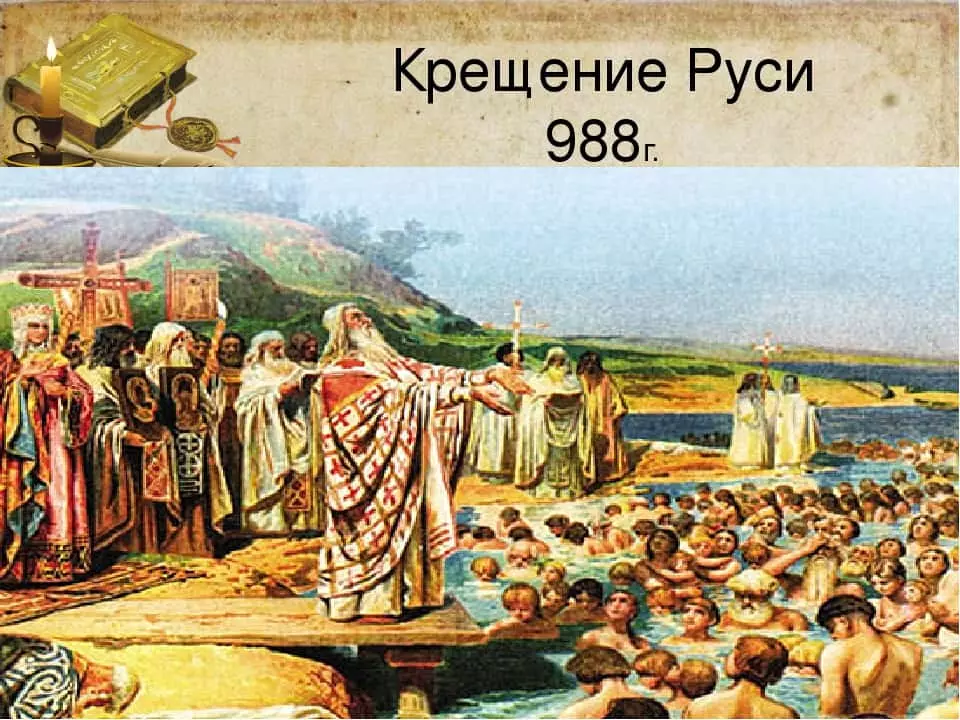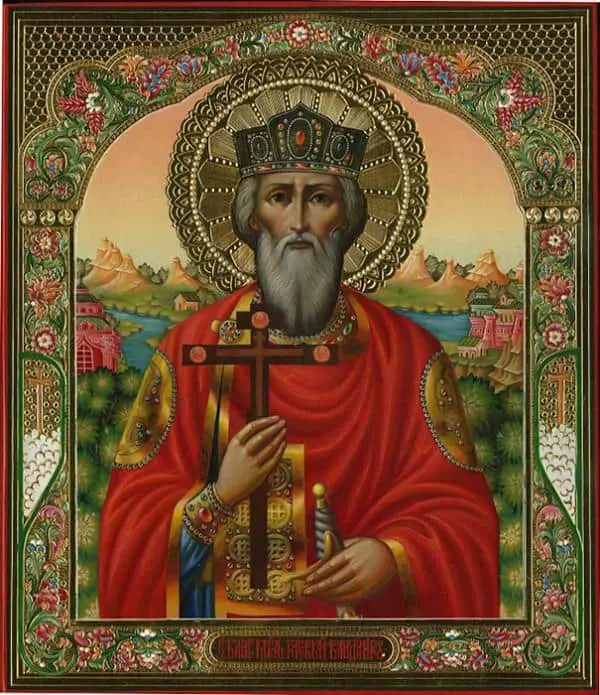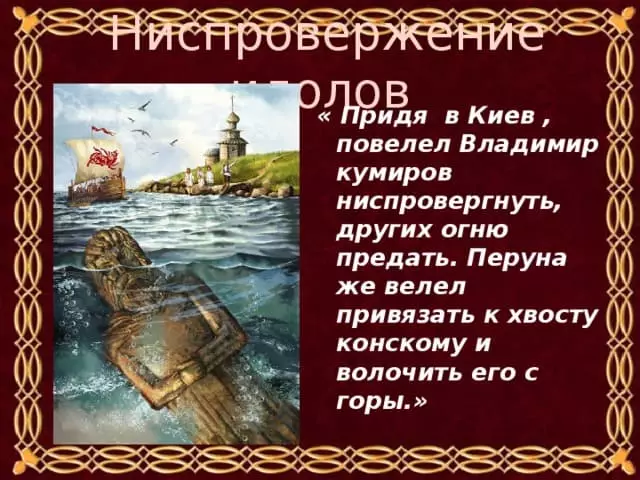Every year on July 28, the Orthodox Church celebrates two festive dates at once - the memory of Holy Prince Vladimir and the Day of the Baptism of Russia. This significant event has become an epochal for our land: a powerful impulse for spiritual and economic development was given. Rus stood in one row with other European states, economic and political cooperation was improved. It is impossible to overestimate this event, as it is impossible to imagine Russia too. In the article, I will tell you about Prince Vladimir, about the brief history of the Christianization of Russia, about related myths and speculations.

Prince Vladimir
Vladimir Krasno Sunnyh is a key figure in the history of the land of Russian, since a significant event occurred during his reign - the adoption of Christianity. According to the legend, the bright prince was looking for a way to unite the Russian people with one faith and sent their messengers to different states to learn about their religions. When the events returned from Byzantium, Prince Vladimir expressed a desire to learn more about the Orthodox faith: it was she who responded to his heart. This event is described in very detailed in the "Tale of Bygone Years" by the chronicler Nestor.
Prince Vladimir conquered the beauty and grandeur of Byzantine temples, the sacrament of the Divine Liturgy, the principles of faith. The pressure of Catholic countries was played an important role: by that time, Catholics were already separated from Orthodox. Prince Vladimir was not to the heart of their claims and political ambitions. The attitude of the Orthodox faith was very different from Catholic, and there was no attempts to dominate the secular power.
Find out what awaits you today - a horoscope for today for all zodiac signs
By numerous subscribers requests, we have prepared an accurate horoscope application for a mobile phone. Forecasts will come for your zodiac sign every morning - it is impossible to miss!
Download free: Horoscope for every day 2020 (Available on Android)
The peaceful adoption of Orthodoxy for Prince was closed, so he decided to go to the Byzantium of War. Vladimir gave himself a vow: if the new lands can win, it will certainly be baptized. His desire was fulfilled. To establish themselves in the new faith, the prince demanded the Byzantine Princess's wife. He brought home from Byzantium a lot of icons, relics and Greek priests.
In 988, V. Vladimir accepted baptism in the city of Chersonese (Corsun), and this event forever changed him as a person and as a ruler. The cruel guide was literally reborn in front of his eyes: He began to deal with the affairs of charity, canceled the death penalty and massacre over dismissal. Every Sunday for the people covered tables, where the poor and hungry could taste the royal dishes. Therefore, Vladimir in the people nicknamed the Red Sun.
On a note! Prince Vladimir not only canceled the death penalty, but did not even want to punish killers and robbers. And only at the insistence of Byzantine priests, he reluctantly returned the death penalty.
Holy Prince Vladimir became famous for the following good deeds:
- fed all hungry;
- dressed in needy and poor;
- helped debtors to return debts;
- released to freedom of slave and prisoners;
- He founded the Tenty Church.
Vladimir also let go on the will of all his pagan concubines and wives and married the Byzantine princess Anna. He stopped fighting with their neighbors and gave repulsion only to nomads who constantly committed raids on Russian lands. With it, education began to develop.

Baptism of Russia
After the king accepted the baptism of the Byzantine priests, he returned to Kiev and dubbed his subjects: boyars, warriors, merchants, elders, princes. It was a competent selected step. People, seeing the baptized officials (and before they were completely trusted), accepted a positive decision regarding the new faith. Once the princes and officials were baptized, it means that this faith is correct and good: it was about that way people were thinking.
The prince first managed to persuade the veche, which was enjoyed by a great authority from the people. The evening reasoned like this: if the princes and the boyars were baptized, then it is good for everyone. People even thought did not arise that the boyars can do something indecent and harmful.
On the morning of July 28, many people gathered at the river. The priests divided them into groups that came to the river in turn. The groups were divided into sexual signs: men and women came separately. Each group of priests gave one Christian name: Male men, women female. Since in worldly use, they continued to use old names, no inconvenience caused it.
The priests tried to count the converts to the faith, but came down from the account.
And what happened to those who did not agree to be baptized? They were simply spent from the city, forever. These measures were dictated by the need: in conditions of constant raids of nomads, the unity of thoughts and actions helped survive. In the old days, the opposition was unacceptable.
The Christianization process was stretched for many years due to huge distances and remoteness of cities from each other. The loyalty of the authorities to pagan rites was obvious: the echoes of pagan beliefs and rites were preserved in the people to this day. For example, the church could not defeat faith in houses, yard, mermaids, left and other evil spirits.
Unlike the tough measures of Catholic countries, Christian and pagan rites coexist peacefully in Russia. In many ways, the Orthodox Church went to meet people: Christian holidays celebrated the days of pagan celebrations familiar to the people. For example, the pagan's step is completely coincided by the date with the Orthodox penitent: only characters changed. If, during pagan people, people celebrated the meeting of spring with winter, then in Christianity they celebrate the meeting of the Old Testament (represented by Simeon's priest) with the new (represented by the Baby of Christ).
Christianization of Russia not only united the whole people with a single faith, but also contributed to the acquisition of a new state status in the international arena . It was an epochal event, to overestimate which is quite difficult.
Meaning of Christianization of Russia:
- strengthening the princely power;
- unification of the people with a single faith;
- acquiring lasting international status;
- polygamy, sacrifices, blood revenge were abolished;
- Development of writing, painting, architecture.
The prince accepted radical measures to oust pagan idols from the land of Russian. Temples and chapels were built on the site of the former Kapple, Eastukanov burned and destroyed. A significant event for Kievan was the overthrow of the main idol - Perun. The prince ordered to throw off the idol, to tie him to the horsepie and hold on the ground to the Dnieper. On the way at the Dnieper, idol was stealing with iron rods. Lasting the idol to the Dnieper, dropped it into the water and let go to flow along the flow. So the centuries-old stage of pagan idolatry in Russia and the bringing of human victims ended.
Literacy, education, culture came with baptism on Rus. It is very difficult to overestimate the positive effect of Christianization.
Kiev residents were prepared for baptism not one month: Vladimir, with the blessing of the Constantinople Patriarch, brought a lot of priests from the Greeks and Bulgarians. The day of baptism was appointed for the summer when the water of the Dnieper warmed up the sun. From the story, we know that the baptism of Kievans in the waters of the Dnieper was massive.

Myths about baptism
Before the baptism of Rus was pagan, and the priests had tremendous power and wealth. The baptism resisted themselves exactly, since it was what to lose. Sometimes the priests sentenced the people and raised to the rebellion. But as soon as the priests were eliminated, people gladly accepted baptism. Opponents of Christianity enjoy the limitation of events and compose various non-residents about the holy baptism. Consider some of them.
Baptism Novgorod "Fire and" Sword " . In fact, the people in Novgorod divided into 2 camps: Some accepted baptism, the second remained the pagans. One day, the pagan matches would upract their fans and was lying on Christians. In a short time, the houses of Christians were looted and burned, people were killed. Uncle Prince Vladimir and his wife was killed. Then the warriors arrived from Kiev to clean up. As a result, the paganism was overthrown, and the people were baptized. There are no references to the annals that they punished the Bunct.
Not all cities hurried to take baptism . In addition to excitement in Novgorod, there were excitements in Murom and Rostov. However, the riot was not religious, but a political character. These cities sought to get out of the control of Kiev and gain independence. Opponents of Christianity are represented solely in religious light.
People baptized violence . This is the argument of opponents of Christianity. The people did not always understand what was happening, so there is no reason to talk about violence. In those days, the princes part-time was performed by the function of pagan priests, so in many cities the baptism passed calmly: they performed the will of the prince.
People killed for refusing to be baptized . Another unplanned argument. Given the long distances and the remoteness of the cities from Kiev, the prince could not be physically able to chrish everyone forcibly. The sacrament of baptism people took voluntarily, imitating their sovereigns. If you remember the death of Prince Igor, who just wanted to increase taxes, it becomes obvious: it was not possible forny Russia.
People rebelled against the new faith . This is not true. First, the princes and elders were baptized, which used absolute confidence in the people. Then the rest of Rusichi followed their example. The people reasoned very simply: if it were not good, then the baptism of the princes and elders would take.
Sometimes pagan priests restrained against the new faith, but these were isolated cases. In general, the baptism of Russia passed peacefully and successfully.
